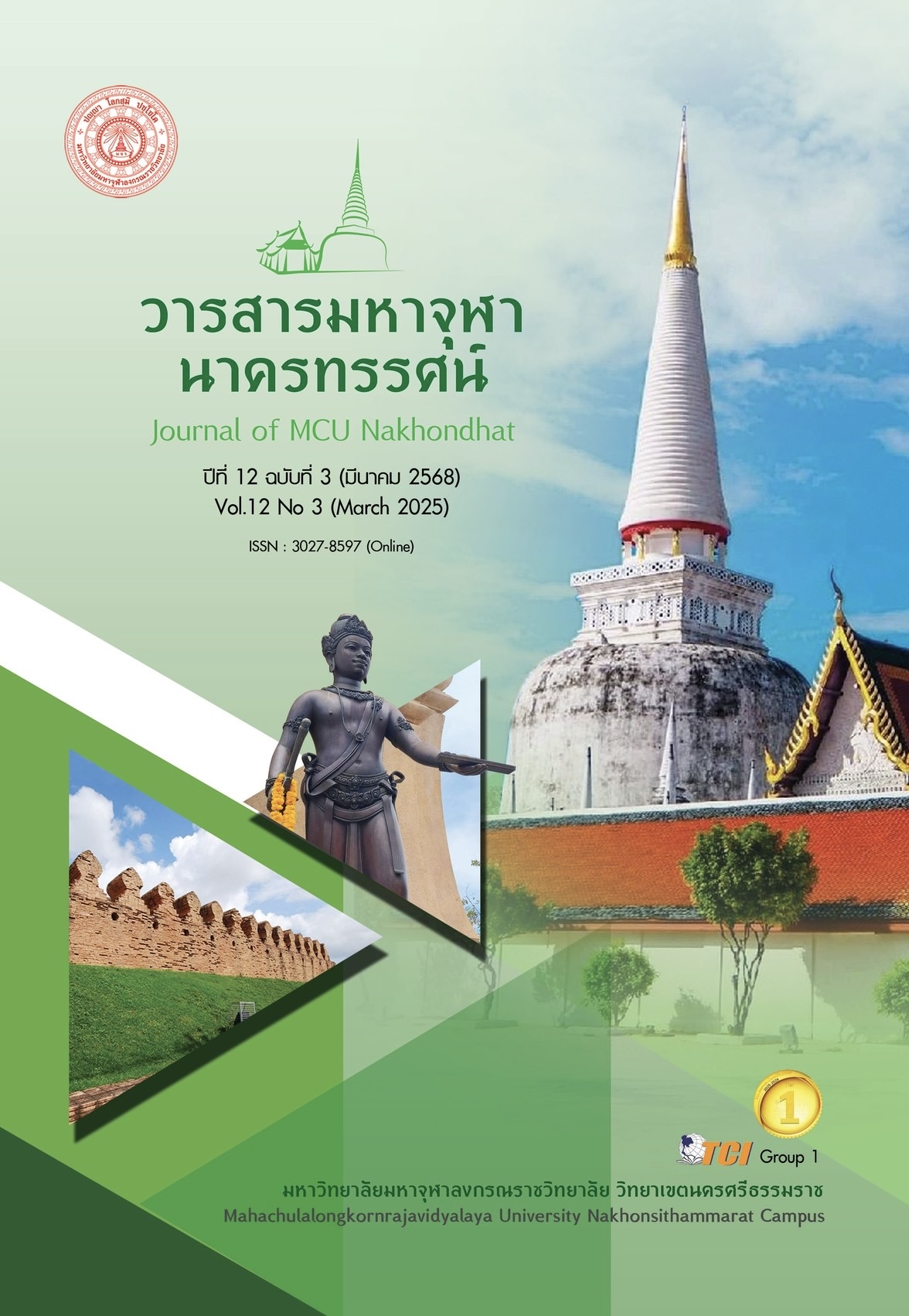DEVELOPMENT OF A LEARNING MANAGEMENT PLAN USING THE DESIGN THINKING PROCESS FOR LOWER SECONDARY STUDENTS TO ENHANCE INTEGRATED PROBLEM-SOLVING COMPETENCY IN CONJUNCTION WITH THE SUSTAINABLE USE OF GENERATIVE ARTIFICIAL INTELLIGENCE NABON SCHOOL NAKHON SI THAMMARAT
Main Article Content
Abstract
The objectives of this research were: 1) To develop and evaluate the quality of learning management plans using design thinking processes for lower secondary school students, and 2) To assess students' integrated problem-solving competencies combined with sustainable creative artificial intelligence (AI) after implementing the developed learning management plans. This research employed an experimental and qualitative research design. The participants consisted of 44 students in grade 9 at Nabon School, selected using simple random sampling through a lottery method. The research instruments included learning management plans based on design thinking processes and an evaluation form for integrated problem-solving competencies combined with sustainable creative AI. Statistical analyses conducted in this research were mean and standard deviation. The research findings indicated that the developed learning management plans were rated at the highest quality level regarding content validity, with an average score of 4.58, and at the highest level of appropriateness, with an average score of 4.64. Furthermore, the overall evaluation of students' integrated problem-solving competencies combined with sustainable creative AI was at an excellent level, achieving an average score of 56.91, equivalent to 94.85%. Students scored full marks (100%) in designing problem-solving methods. Additionally, their competency scores for problem understanding reached 98.48%, while scores for problem-solving method exploration reached 97.73%. Overall, the evaluation reflected the effectiveness of integrating design thinking processes with AI in enhancing sustainable creative problem-solving competencies. This study thus provided significant insights into developing learning approaches aligned with 21st-century educational demands and promoting students' competencies related to sustainability.
Article Details

This work is licensed under a Creative Commons Attribution-NonCommercial-NoDerivatives 4.0 International License.
References
กระทรวงการอุดมศึกษา วิทยาศาสตร์ วิจัย และนวัตกรรม และกระทรวงดิจิทัลเพื่อเศรษฐกิจและสังคม. (2565). แผนปฏิบัติการด้านปัญญาประดิษฐ์แห่งชาติเพื่อการพัฒนาประเทศไทย (พ.ศ. 2565 - 2570). เรียกใช้เมื่อ 9 ตุลาคม 2567 จาก https://ai.in.th/wp-content/uploads/2022/12/20220726-AI.pdf
ณภัทร วอนศิริ และคณะ. (2565). การพัฒนาสมรรถนะการแก้ปัญหาที่ซับซ้อนของนักเรียนชั้นมัธยมศึกษาปีที่ 3 ผ่านการจัดการเรียนรู้การออกแบบเชิงวิศวกรรมโดยใช้ปัญหาเป็นฐาน. วารสารศึกษาศาสตร์ มหาวิทยาลัยนเรศวร, 24(3), 147-157.
ธีระศักดิ์ ธนากูลกวีพงศ์ และคณะ. (2566). การพัฒนากิจกรรมการเรียนการสอนทางเรขาคณิตที่เสริมสร้างความสามารถในการแก้ปัญหาอย่างมีวิจารณญาณผ่านกระบวนการคิดเชิงออกแบบ สำหรับนักเรียนระดับมัธยมศึกษา. วารสารสหวิทยาการมนุษยศาสตร์และสังคมศาสตร์, 6(2), 811-830.
บุญชม ศรีสะอาด. (2553). การวิจัยเบื้องต้น. กรุงเทพมหานคร: สุวีริยาสาส์น.
ปภัสสร คงนิสัย และคณะ. (2567). การพัฒนากิจกรรมการเรียนการสอนโดยใช้กระบวนการคิดเชิงออกแบบร่วมกับเกมมิฟิเคชันเพื่อส่งเสริมความสามารถในการคิดแก้ปัญหาสำหรับนักเรียนระดับประกาศนียบัตรวิชาชีพ. วารสารสังคมศาสตร์และวัฒนธรรม, 8(10), 1-14.
รัตนาภรณ์ ทรงนภาวุฒิกุล. (2560). การวัดและประเมินผลการเรียนรู้ด้วยการให้คะแนนแบบรูบริค : Scoring Rubrics. วารสารบัณฑิตวิทยาลัย, 12(1), 1-14.
วนัสนันท์ ชูรัตน์ และคณะ. (2566). การพัฒนาทักษะการแก้ปัญหาอย่างสร้างสรรค์โดยใช้รูปแบบการแก้ปัญหาอย่างสร้างสรรค์ร่วมกับอินโฟกราฟิก สำหรับนักเรียนชั้นมัธยมศึกษาปีที่ 5 เรื่อง กรด-เบส. วารสารศึกษาศาสตร์ มหาวิทยาลัยนเรศวร, 25(3), 229-239.
วิศิษฐ์ศักดิ์ บุญจิตต์ และจิรพันธุ์ ศรีสมพันธุ์. (2567). การพัฒนาแผนจัดการเรียนรู้ตามกระบวนการคิดเชิงออกแบบร่วมกับบทเรียนออนไลน์รายวิชาการออกแบบและเทคโนโลยี ชั้นมัธยมศึกษาตอนต้นเพื่อส่งเสริมการแก้ปัญหาเชิงสร้างสรรค์. ใน การประชุมทางวิชาการระดับชาติด้านครุศาสตร์อุตสาหกรรม ครั้งที่ 15. มหาวิทยาลัยเทคโนโลยีพระจอมเกล้าพระนครเหนือ.
วิศิษฐ์ศักดิ์ บุญจิตต์ และสุธิดา ชัยชมชื่น. (2567). การศึกษาระดับสมรรถนะหลักเพื่อความยั่งยืนของนักศึกษาคณะครุศาสตร์ มหาวิทยาลัยราชภัฏนครศรีธรรมราช. ใน การประชุมวิชาการครุศาสตร์อุตสาหกรรมระดับชาติ ครั้งที่ 16. มหาวิทยาลัยเทคโนโลยีพระจอมเกล้าพระนครเหนือ.
สำนักงานเลขาธิการสภาการศึกษา. (2560). แผนการศึกษาแห่งชาติ พ.ศ. 2560 - 2579. เรียกใช้เมื่อ 9 ตุลาคม 2567 จาก https://backoffice.onec.go.th/uploads/Book/1540-file.pdf
สุรพล บุญลือ. (2567). แนวทางการใช้ปัญญาประดิษฐ์รังสรรค์สำหรับการศึกษาและวิจัย. Journal of Industrial Education, 23(2), B1-B12.
Albay, E. M. & Eisma, D. V. (2025). Using design thinking for developing pre-service teachers’ creativity in designing teaching plans to promote interactive learning in mathematics. Learning and Instruction, 96(2025), 102070.
Imjai, N. et al. (2024). The influence of AI competency and design thinking skills on innovative entrepreneurial competency: The role of strategic intelligence amongst new age entrepreneurs in Thailand. International Journal of Information Management Data Insights, 4(2), 100301.
Lang-Wojtasik, G. & Rieckmann, M. (2011). Die globale Perspektive der Bildung für nachhaltige Entwicklung. Eine europäisch-lateinamerikanische Studie zu Schlüsselkompetenzen für Denken und Handeln in der Weltgesellschaft. ZEP : Zeitschrift für internationale Bildungsforschung und Entwicklungspädagogik, 34(2), 41-42.
Romulo, C. et al. (2024). Implementing interdisciplinary sustainability education with the food-energy-water (FEW) nexus. Humanities and Social Sciences Communications, 11(1), 1-17.
Taimur, S. & Onuki, M. (2022). Design thinking as digital transformative pedagogy in higher sustainability education: Cases from Japan and Germany. International Journal of Educational Research, 114(2022), 101994.
Uzorka, A. et al. (2024). Strategies for engaging students in sustainability initiatives and fostering a sense of ownership and responsibility towards sustainable development. Discover Sustainability, 5(1), 320.
Wyk, M. M. (2024). Is ChatGPT an opportunity or a threat? Preventive strategies employed by academics related to a GenAI-based LLM at a faculty of education. Journal of Applied Learning & Teaching, 7(1), 35-45.


